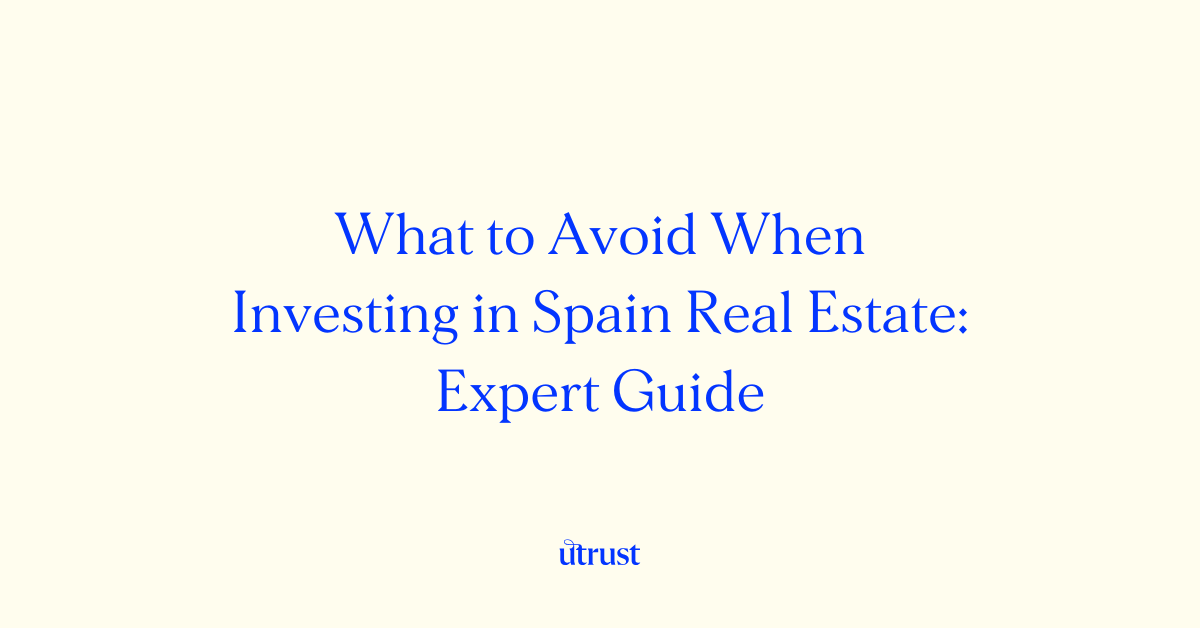Spain has become one of the most sought-after destinations for real estate investors, with a thriving market that offers a range of attractive opportunities. However, investing in Spanish property can be a complex and sometimes risky endeavor, especially for international investors unfamiliar with local laws, market conditions, and customs. In this post, we will highlight the top mistakes to avoid when investing in Spanish real estate, providing you with expert insights to help you make informed and successful investment decisions.
1. Failing to Do Your Research: The Foundation of a Successful Investment
One of the biggest mistakes investors make is not conducting thorough research before diving into the Spanish real estate market. Spain’s property market can vary greatly from region to region, and understanding these nuances is crucial to making a sound investment.
- Market Trends: Research the local property market trends, including price fluctuations, supply and demand, and the long-term growth potential of specific areas.
- Legal Implications: Understand the legal framework for property ownership, particularly if you’re a foreign investor, and ensure you’re aware of any laws that may differ from your home country.
- Tax Regulations: Familiarize yourself with Spain’s property tax laws, including capital gains tax, inheritance tax, and rental income tax.
2. Overestimating Potential Returns: Be Realistic About Your Earnings
While the Spanish real estate market can offer attractive returns, many investors make the mistake of overestimating the potential earnings from their investments. The allure of high returns can cloud judgment and lead to poor decisions.
- Conduct a Feasibility Study: Assess whether the property will generate sufficient rental income or capital gains over time. Compare rental prices, expected occupancy rates, and property appreciation in the area.
- Factor in Costs: Remember to account for all costs, including property maintenance, insurance, taxes, and management fees, when calculating potential returns.
3. Ignoring Location: The Key to Long-Term Value
In real estate, the location is everything. Investing in properties located in less desirable or underdeveloped areas can result in poor returns. Whether you’re buying for rental income or capital appreciation, location plays a critical role in determining the value and desirability of your property.
- Accessibility: Ensure the property is easy to access by major transport links and close to local amenities such as schools, shopping centers, and healthcare.
- Market Demand: Research whether there is demand for properties in that area, both for long-term rentals and holiday homes.
- Future Development: Look into future infrastructure projects or planned developments in the area, as these can significantly increase property value over time.
4. Neglecting Due Diligence: Protect Yourself with Thorough Checks
Before committing to any investment, it’s essential to conduct comprehensive due diligence. Skipping this crucial step can lead to costly mistakes, such as purchasing a property with legal or financial issues.
- Verify Ownership and Legal Status: Confirm that the seller has legal ownership of the property and that there are no outstanding debts or legal disputes.
- Check Permits and Licenses: Ensure that the property has the necessary building permits, licenses for rental, and complies with local zoning laws.
- Review Property Documents: Carefully review the property’s legal documents, including the land registry, tax records, and any liens or encumbrances.
5. Underestimating the Costs: Budgeting for Your Investment
Many investors fail to account for all the hidden costs associated with purchasing and owning property in Spain. While the property price is a significant factor, there are other financial considerations to keep in mind.
Common Additional Costs:
Common Additional Costs:
- Taxes and Fees: These include stamp duty, notary fees, land registry fees, and local taxes.
- Maintenance Costs: Especially if you’re purchasing a second home or rental property, budget for ongoing maintenance and property management.
- Insurance: Don’t forget to factor in homeowner’s insurance, especially if the property is used as a rental.
Ready to Invest in Spain? Receive Expert Guidance for a Profitable Investment
Investing in Spanish real estate can be highly profitable, but it’s crucial to avoid these common mistakes to ensure a successful venture. Conduct thorough research, have realistic expectations, choose the right location, and work with qualified professionals to protect your investment.
If you're ready to take the next step in investing in Spanish property, contact us today via info@utrust.es for expert legal guidance and personalized advice. At UTRUST, we’re here to ensure that your Spanish real estate investment is legally sound, smooth, and successful.
If you're ready to take the next step in investing in Spanish property, contact us today via info@utrust.es for expert legal guidance and personalized advice. At UTRUST, we’re here to ensure that your Spanish real estate investment is legally sound, smooth, and successful.
